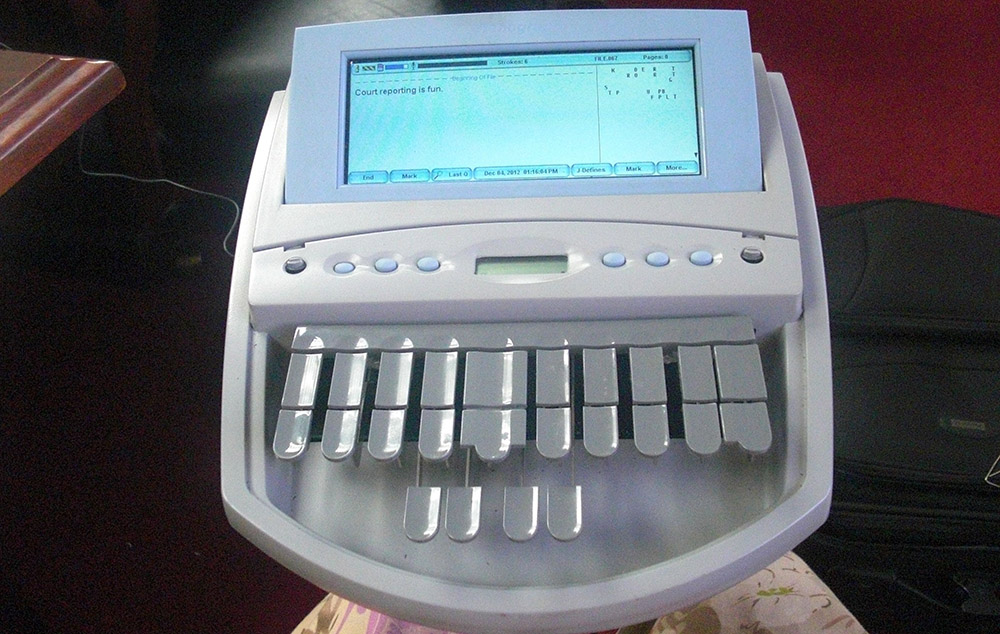How court reporting Is Providing Accuracy to Emotional and Complex Testimonies
How court reporting Is Providing Accuracy to Emotional and Complex Testimonies
Blog Article

The Future of Court Coverage: Technologies and Fads Forming the Sector
As you explore the future of court reporting, you'll observe a shift driven by innovation and advancement. Real-time transcription and AI applications are reshaping how legal procedures are documented. With remote depositions getting traction, the landscape is advancing swiftly. It elevates concerns regarding the function of court reporters and the skills they'll need relocating ahead. What does this mean for specialists in the field? The solution may shock you.
The Influence of Artificial Intelligence on Court Reporting
As fabricated intelligence continues to evolve, it's improving the landscape of court reporting in methods you may not anticipate. AI can examine huge amounts of legal text, assisting you identify pertinent precedents and enhance case preparation.
Moreover, AI can improve the prep work process by using anticipating analytics, which can help you anticipate test outcomes based on historic data. With AI handling routine tasks, you can focus a lot more on your core responsibilities, such as making sure precision and supplying important lawful insights.
Real-Time Transcription: Enhancing Accuracy and Effectiveness
Real-time transcription has revolutionized the court reporting procedure, making it easier than ever before for you to capture accurate records on the spot. With innovative modern technology, you can currently provide prompt transcripts throughout hearings or depositions, ensuring that all parties have accessibility to crucial details immediately. This immediacy not just enhances the general efficiency of the legal procedure yet likewise enables you to focus on the dialogue, instead of rushing to catch up.
As you utilize real-time transcription, you'll see a considerable decrease in errors, thanks to automated checking devices that flag inconsistencies as you kind. Furthermore, clients appreciate the ability to evaluate records instantly, making it possible for quicker decision-making and smoother process. By welcoming this innovation, you're not simply improving your workflow; you're setting a brand-new requirement in court reporting that prioritizes precision and performance. This forward-thinking approach positions you at the center of the advancing legal landscape (court reporting).
The Increase of Remote Depositions

With the growing demand for flexibility in legal proceedings, remote depositions have emerged as a game-changer in court reporting. You can now join depositions from anywhere, eliminating travel time and costs. This benefit enables you to concentrate on what absolutely matters-- preparing your instance.
Remote depositions use innovative technology, allowing real-time communication and document sharing. You can involve with witnesses and attorneys effortlessly, making sure that everyone stays connected despite their physical area. This approach not only conserves time but additionally increases your pool of professional witnesses, as geographical barriers come to be much less of a concern.
As remote depositions gain popularity, it's essential to adapt to this brand-new norm. Acquaint yourself with the required tools and procedures to ensure a smooth experience - court reporting. Accepting this advancement can provide you an one-upmanship, enabling you to browse the ever-evolving landscape of legal proceedings efficiently
Digital Courtrooms: Changing the Lawful Landscape
As you enter the globe of electronic courts, you'll discover exactly how digital hearing technology is improving lawful process. This change not just makes gain access to simpler yet additionally enhances transcription accuracy, ensuring every word is recorded properly. Welcoming these improvements can substantially improve the effectiveness of the lawful process.
Online Hearing Innovation
While the traditional courtroom setup has actually long been a sign of justice, the surge of virtual hearing modern technology is improving how legal proceedings are performed. In enhancement, digital hearings can enhance involvement, enabling witnesses and experts to give testament without the constraints of place. As you adapt to these changes, you'll observe that online hearings keep the honesty of the legal process while accepting technology, ultimately transforming the method justice is served in the modern globe.
Improved Transcription Accuracy
Enhanced transcription precision is revolutionizing the legal area, making court procedures a lot more trusted than ever before. With innovations in speech recognition technology and AI-driven tools, you can expect to see a considerable decrease in transcription errors. These advancements not only capture every word talked however likewise make up nuances in tone and context, boosting overall understanding. Consequently, vital information aren't shed in translation, making certain that the honesty of the lawful process is kept. Moreover, real-time transcription permits have a peek at this site you to access exact documents promptly, promoting smoother communication throughout trials. Accepting these technologies implies you're entering a future where clearness and accuracy in lawful documentation are critical, inevitably profiting all events associated with the judicial system.
The Role of Court Reporters in Virtual Hearings
Court press reporters play a necessary function in virtual hearings, guaranteeing that every word talked is precisely caught and recorded in real-time. As a stenotype reporter, you facilitate communication in between parties, making complex lawful proceedings obtainable. Your competence in legal terminology and the ability to promptly adapt to numerous audio speakers are critical in this digital environment.
Throughout digital hearings, you preserve an unwavering emphasis, also in the middle of technical difficulties or disturbances. You supply a clear, written record that can be referenced later on, helping courts, attorneys, and customers recognize the proceedings. Your skills in guiding different platforms assure that you can seamlessly incorporate right into any type of virtual configuration.
Furthermore, you likewise help copyright the stability of the judicial procedure, confirming that every individual's voice is heard. By doing this, you not only improve the performance of lawful procedures but likewise contribute to the total justness and openness of the justice system.
Developments in Documentation and Record Keeping
As technology progresses, technologies in paperwork and document keeping are changing exactly how court reporters catch and manage legal records. You'll find that electronic devices permit quicker and more exact transcription, minimizing the opportunities of human error. Cloud-based storage space solutions allow you to firmly keep and access documents from anywhere, making collaboration with legal teams seamless.
Expert system is also playing a significant duty, helping with real-time transcription and also supplying clever editing and enhancing attributes. These advancements not only improve performance however additionally guarantee that you can give high-quality paperwork in a hectic legal setting.
Additionally, the assimilation of voice acknowledgment software application simplifies the process, allowing you to concentrate much more on the subtleties of the procedures as opposed to just keying. By embracing these technologies, you're positioned to raise your skills and satisfy the demands of modern court reporting properly.
Future Skills and Training for Court Reporters
While technology improves the landscape of legal procedures, it's crucial for stenotype reporter to adapt by getting brand-new abilities and training. You'll need to acquaint yourself with innovative transcription software application and digital coverage tools to stay competitive. Accepting artificial intelligence and real-time captioning will certainly boost your efficiency and precision.
Furthermore, developing solid research and analytical abilities is vital. You'll usually run into complicated legal lingo and treatments, so understanding legal concepts will develop your reporting. On-line courses and workshops can offer important insights right into these locations.
Connecting with other specialists will certainly also assist you remain upgraded on market trends. Joining companies or going to meetings can subject you to new technologies and finest techniques.
Lastly, honing you can look here your interpersonal skills will improve interaction with lawyers and clients. By concentrating on these locations, you'll place yourself for success in the progressing field of court coverage.
Regularly Asked Inquiries

What Certifications Are Needed to End Up Being a Court Reporter Today?
To end up being a court reporter today, you'll require a secondary school diploma, specialized training in court coverage, and certification, frequently through a nationwide test. Solid keying skills and attention to information are necessary for success.
Just How Can Court Reporters Stay Updated With New Technologies?
To remain updated with new technologies, you must go to workshops, sign up with professional companies, and sign up for relevant publications. Connecting with peers and participating in on the internet forums can also keep you informed regarding the current developments.
What Is the Ordinary Salary for Court Reporters Currently?
The typical salary for court press reporters varies by place and experience, however you can anticipate around $50,000 to $70,000 each year. In some areas, experienced reporters can earn also more, particularly with specialized skills.
Are There Job Opportunities for Court Reporters in Non-Legal Area?
Yes, there are job chances for stenotype reporter in non-legal fields. You can find duties in closed captioning, transcription services, and media, where your abilities in capturing talked language are very valued read this post here and searched for.
Just How Does Court Reporting Differ in Various Nations?
Court reporting varies significantly across nations. You'll locate distinctions in terminology, technology, and legal systems. For example, some countries emphasize digital coverage, while others still depend on conventional stenography techniques for capturing spoken words.
Report this page